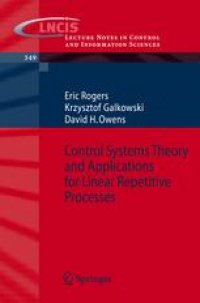
Ebook: Control Systems Theory and Applications for Linear Repetitive Processes
- Tags: Control Engineering, Systems and Information Theory in Engineering, Systems Theory Control
- Series: Lecture Notes in Control and Information Sciences 349
- Year: 2007
- Publisher: Springer-Verlag Berlin Heidelberg
- Edition: 1
- Language: English
- pdf
After motivating examples, this monograph gives substantial new results on the analysis and control of linear repetitive processes. These include further applications of the abstract model based stability theory which, in particular, shows the critical importance to the dynamics developed of the structure of the initial conditions at the start of each new pass, the development of stability tests and performance bounds in terms of so-called 1D and 2D Lyapunov equations. It presents the development of a major bank of results on the structure and design of control laws, including the case when there is uncertainty in the process model description, together with numerically reliable computational algorithms. Finally, the application of some of these results in the area of iterative learning control is treated --- including experimental results from a chain conveyor system and a gantry robot system.
A repetitive process consists of a series of sweeps, termed passes, through a set of dynamics which is only defined over a finite duration known as the pass length. On completion of each pass, the process is reset and the operation performed again where the output, or pass profile, produced on the previous pass acts as a forcing function on, and hence contributes to, the dynamics of the next pass profile. The unique problem then is that the sequence of pass profiles generated can contain oscillations that increase in amplitude in the pass-to-pass direction. Such behavior is easily generated in simulation studies and in experiments of scaled models of industrial examples.
Attempts to control these processes by direct application of existing techniques fail precisely because such an approach ignores the finite pass length repeatable nature of these processes and also the influence of resetting the initial conditions before the start of each new pass. Moreover, the structure of these initial conditions can be an explicit function of the previous pass profile, which is an added complexity to the overall problem. These processes differ from other classes of 2D systems essent
A repetitive process consists of a series of sweeps, termed passes, through a set of dynamics which is only defined over a finite duration known as the pass length. On completion of each pass, the process is reset and the operation performed again where the output, or pass profile, produced on the previous pass acts as a forcing function on, and hence contributes to, the dynamics of the next pass profile. The unique problem then is that the sequence of pass profiles generated can contain oscillations that increase in amplitude in the pass-to-pass direction. Such behavior is easily generated in simulation studies and in experiments of scaled models of industrial examples.
Attempts to control these processes by direct application of existing techniques fail precisely because such an approach ignores the finite pass length repeatable nature of these processes and also the influence of resetting the initial conditions before the start of each new pass. Moreover, the structure of these initial conditions can be an explicit function of the previous pass profile, which is an added complexity to the overall problem. These processes differ from other classes of 2D systems essent
Content:
Front Matter....Pages I-XIV
Examples and Representations....Pages 1-40
Stability - Theory, Tests and Performance Bounds....Pages 41-83
Lyapunov Equations for Discrete Processes....Pages 85-116
Lyapunov Equations for Differential Processes....Pages 117-140
Robustness....Pages 141-175
Controllability, Observability, Poles and Zeros....Pages 177-234
Feedback and Optimal Control....Pages 235-304
Control Law Design for Robustness and Performance....Pages 305-367
Application to Iterative Learning Control....Pages 369-426
Conclusions and Further Work....Pages 427-449
Back Matter....Pages 451-468
A repetitive process consists of a series of sweeps, termed passes, through a set of dynamics which is only defined over a finite duration known as the pass length. On completion of each pass, the process is reset and the operation performed again where the output, or pass profile, produced on the previous pass acts as a forcing function on, and hence contributes to, the dynamics of the next pass profile. The unique problem then is that the sequence of pass profiles generated can contain oscillations that increase in amplitude in the pass-to-pass direction. Such behavior is easily generated in simulation studies and in experiments of scaled models of industrial examples.
Attempts to control these processes by direct application of existing techniques fail precisely because such an approach ignores the finite pass length repeatable nature of these processes and also the influence of resetting the initial conditions before the start of each new pass. Moreover, the structure of these initial conditions can be an explicit function of the previous pass profile, which is an added complexity to the overall problem. These processes differ from other classes of 2D systems essent
Content:
Front Matter....Pages I-XIV
Examples and Representations....Pages 1-40
Stability - Theory, Tests and Performance Bounds....Pages 41-83
Lyapunov Equations for Discrete Processes....Pages 85-116
Lyapunov Equations for Differential Processes....Pages 117-140
Robustness....Pages 141-175
Controllability, Observability, Poles and Zeros....Pages 177-234
Feedback and Optimal Control....Pages 235-304
Control Law Design for Robustness and Performance....Pages 305-367
Application to Iterative Learning Control....Pages 369-426
Conclusions and Further Work....Pages 427-449
Back Matter....Pages 451-468
....